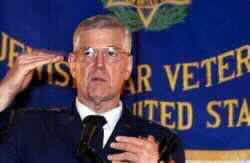HIGHLIGHTS: Israeli Leaders Believe Delaying Attack or Canceling it Is More Dangerous Than Not Assailing Baghdad||If Attacked by Iraq, Israel Won't Exercise Restraint as in 1991||Iraq Demands Neutral Observers Accompany UN Weapon's Inspectors||Blair Blocks Cabinet Debate on Iraq|| STORY: Israeli Prime Minister Ariel Sharon has urged the United States not to delay its threatened strike on Iraq any further.
Postponing a military operation against Iraqi President Saddam Hussein's regime "will not create a more convenient environment for action in the future," the Israeli daily Haaretz quoted Sharon as saying Friday in a message sent to the US administration.
Foreign Minister Shimon Peres voiced much the same opinion on CNN overnight.
"The problem today is not if but when," Peres told the news network, "and if they think we wait, Saddam will change, and if he will change, it ... will be for the worse; he will have more weapons."
Both Sharon and Peres stressed, however, that they would respect any US decision and were not seeking to pressure Washington to launch an attack on Iraq.
Israel fears that if Washington attacks Iraq, part of Baghdad's response will be an attack on the Jewish state, as happened during the Gulf War in 1991 when 39 Scud missile smacked into Israel, killing two people and injuring hundreds.
However, Sharon has repeatedly warned US President George W. Bush that Israel will respond and not exercise restraint as was the case then.
NEUTRAL OBSERVERS MUST MONITOR ARMS INSPECTION: IRAQ
Meanwhile, union officials and the media in Baghdad said Iraq is to say it will agree to the return of UN arms inspectors if they are accompanied by neutral observers including British religious leaders.
The Independent, quoting what it described as senior diplomatic sources, which it did not name, said Baghdad was sending a letter to UN Secretary General Kofi Annan, which was likely to demand that any observers ensure the inspections are not spying missions.
The letter would also demand that "doctored findings of weapons of mass destruction" were not used to justify an American attack against the regime of Iraqi President Saddam Hussein, the sources told the paper.
Iraq would insist that a large proportion of the delegation came from Europe, and that the United Nations does not let the US administration veto its composition, the Independent added Friday.
BLAIR BLOCKS A CABINET DEBATE ON IRAQ
Meanwhile, the Guardian daily reported that British Prime Minister Tony Blair has blocked a debate by his cabinet on whether Britain should join US-led military action against Iraq.
The paper said that ministers had been told that any decisions were still a long way off when they had approached Blair privately to ask for a cabinet discussion of the issue.
Downing Street, however, said it "did not recognise" the events as represented in the paper.
A spokesman said: "We have said many times that no decisions have yet been taken. The position has not changed."
Blair is US President George W. Bush's closest ally in Europe on the Iraq question, despite opinion polls which suggest that a majority of Britons do not want British troops to join a US-led strike on Baghdad.
Meanwhile, a spokesman for Robin Cook, a senior figure in the ruling Labour Party, declined to comment on a report in The Times that he was planning to make it clear to Blair that he had deep reservations about military action.
Speculation over possible cabinet splits on the issue has been heightened by growing unease among the ruling Labour Party about American intentions in the Middle East.
The issue is expected to dominate Labour's annual conference in Blackpool, northwest England, this autumn.
Some 160 MPs, most of them Labour politicians without a position in government, have signed a parliamentary motion cautioning against overhasty action in Iraq.
Concerns were fuelled by comments from Bush's national security adviser Condoleezza Rice, who warned Thursday on BBC radio that "there is a very powerful moral case for regime change," adding: "We certainly do not have the luxury of doing nothing."
Her comments were interpreted by several British newspapers as an attempt by the US to stiffen British resolve over a war against Iraq.
Labour member of parliament Alice Mahon, who tabled the anti-war motion, condemned Rice's comments: "Who can possibly argue that there is anything moral about killing other people's children?
"It is outrageous that a representative of the United States government, and a woman, should suggest that there is."
PHOTO CAPTION
Gen. Richard Myers, chairman of the Joint Chief of Staff, delivers the keynote address Thursday, Aug. 15, 2002, to the Jewish War Veterans 107th National Convention in Savannah, Ga. Myers addressed the country's war on terrorism, but declined comment when asked about possible U.S. attacks on Iraq. (AP Photo/Stephen Morton)
- Aug 15 4:05 PM ET
- Author:
& News Agencies - Section:
WORLD HEADLINES


 Home
Home Discover Islam
Discover Islam Quran Recitations
Quran Recitations Lectures
Lectures
 Fatwa
Fatwa Articles
Articles Fiqh
Fiqh E-Books
E-Books Boys & Girls
Boys & Girls  Women
Women










